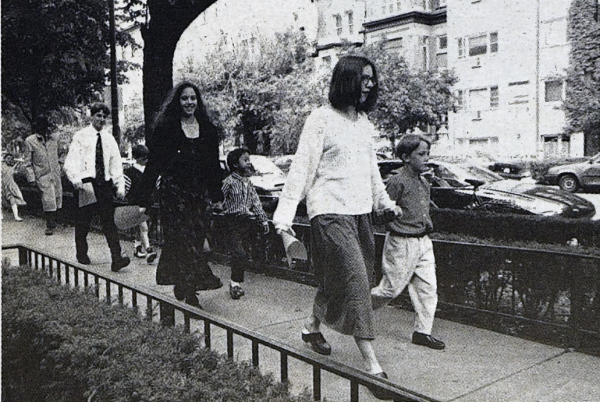The Notorious RBG: Her Legacy
(AP Photo/Jacquelyn Martin)
On September 18, U.S. Supreme Court Justice Ruth Bader Ginsburg died of complications from metastatic pancreatic cancer. This was her fifth bout with cancer, and she passed away at 87 years of age. Despite Justice Ginsburg’s deathbed wish that the new President select her replacement, President Trump nominated Amy Coney Barrett, Justice Ginsburg’s ideological opposite, in the Rose Garden on September 26.
Ruth Bader Ginsburg’s expected yet sobering death was prefaced by a life of history-making feats. After attending both Columbia and Harvard Law School, where she was one of only nine women in her class, she struggled to find employment as a practicing lawyer. But after several years teaching at Rutgers Law School, she began working on sex-based discrimination cases. Her success in these early cases, as well as her outstanding knowledge of constitutional law, led her to become the second female Supreme Court nominee, in 1993.
Upper School History Department Chair and U.S. history teacher Cara Gallagher, who has covered the Supreme Court for C-SPAN almost every summer since 2013, commented on the significance of Justice Ginsburg’s death.
“When you only have nine people who have the opportunity to represent one entire branch of government, it’s going to be a huge loss when someone passes, especially when they don’t retire but die in the role,” she said, adding that Justice Ginsburg’s death at this time didn’t give the country enough time to appreciate her legacy, as people are already focusing on the political ramifications of a vacancy on the Supreme Court.
Ms. Gallagher, like many others, credits Justice Ginsburg for much of her success in journalism, a predominantly male field. “I see her as a role model, as a woman,” Ms. Gallagher said. “When I walk into the court to work in the press gallery, I’m one of the few women who do that job. You notice when you are one of the few people in any space. What you do is look at the women who are on the Supreme Court bench, and it’s amazing in my life to be able to see three of them on there.”
One case Ms. Gallagher highlighted to illustrate Justice Ginsburg’s impact was her important dissent in Shelby County v. Holder, a decision many feel drastically set back protections of the landmark 1965 Voting Rights Act. Ms. Gallagher recalls hearing gasps in the courtroom when Justice Ginsburg presented the dissent alongside the other Justices. She emphasized that Justice Ginsburg did some of her most important work in her decisions and dissents supporting civil rights, same sex marriage, and voting rights.
But aside from her legacy as a strong-willed justice devoted to equality, she was also known for her good friendship with her ideological opposite, Justice Antonin Scalia. “I think it’s a real testament to two people who have incredible intellects, who know how unique their jobs are and how difficult their jobs are, who can find common ground because of their stages in life, how hard they work, respect for the Constitution, and because of the respect they have for service,” Ms. Gallagher said. “It doesn’t happen organically. You have to put in the work.”
Federal appellate judge Amy Coney Barrett, at her recent nomination ceremony, also expressed admiration for the deep friendship between Justices Scalia and Ginsburg and for their ability to disagree about ideas “without rancor.” Judge Barrett honored RBG’s legacy and praised her for “smashing the glass ceiling.”
Latin students also reflected on Justice Ginsburg’s legacy in classes and extracurricular groups. The Intersectional Feminism Alliance (IFA), formerly known as Latin’s Alliance for Women (LAW), hosted a meeting last week to discuss the life and legacy of RBG through the lens of the clubs’ theme this year: intersectionality. Ivy Schenk, a senior and co-head of IFA, said, “She really represents so much, not only about feminism but also about standing up for what you believe in and being a voice in a room full of people that disagree with you.”
Justice Ginsburg was a Jewish woman born in the first half of the 20th century. Her father immigrated to the U.S. from Ukraine in 1911, and they lived in a low-income neighborhood in Brooklyn during Ginsburg’s upbringing. The way that her Jewish and her white racial identity affected her journey to the Supreme Court was a heavily discussed topic during the IFA meeting. However, the group also discussed Ginsburg’s privileges and how they may have helped her success. Freddi Mitchell, another senior and co-head of IFA, said, “The fact that she was a Jewish woman definitely caused some setbacks in her life and really, in her early life especially, made it challenging for her to even pursue school. But the fact that she was white allowed her to be one of the first women on the Supreme Court.”
Still, the group agreed that Justice Ginsburg’s life embodied many of their core values. “With LAW turning into IFA, we’ve been trying to go over the fact that feminism isn’t just for women, it’s for more than that,” Ivy said. “And so, I think that in that way she represents what feminism is actually about, which is equality for all, and getting rid of gender stereotypes in general.” Freddi agreed, adding that representing male plaintiffs “was a way to, basically, play to the fragility of white male Supreme Court justices, because putting a woman out there and claiming sex discrimination is different to putting a man out there.”
Justice Ginsburg received some criticism for her centrist views and “one step at a time” philosophy. Senior Charlotte O’Toole said she had asked her breakout room during the IFA meeting if they believed that RBG’s slow but steady approach should be applied to politics in 2020. They came to the conclusion that, now that gender inequality is more widely acknowledged, activists ought to take bigger steps, even though asking for change is risky. “I think there’s something really powerful in having power and then deciding and being in charge of when you want to use it,” Ivy said. “She was very tactical in everything she did.”
Perhaps the most significant part of Justice Ginsburg’s legacy is in the lessons she taught young women. “To have a really strong Jewish woman be in a space where she can make changes was huge to me,” Ivy said. The biggest lesson she learned from researching Justice Ginsburg’s legacy? “Knowing when to use your voice.”
Charlotte echoed Ivy’s comment, saying, “Seeing that picture of her surrounded by male justices—that meant a lot to me. Because, being a woman in an all-male environment, I’ve dealt with that before as a basketball referee, and in my classes. She was okay with being the only one there, still holding her ground and being really strong.” Charlotte went on to explain how RBG’s dedication despite hardships was inspiring to her, concluding, “She taught me to work hard.”
Freddi said, “I think she brought the judicial branch to the forefront for a lot of young Americans, because, I mean, she became a pop culture icon. She taught me that I can be a lawyer. She’s the reason that I want to be a lawyer.” Sharing what she took from Justice Ginsburg’s life story, Freddi simply said, “Fight until the end.”

Angela Gil (’21) is a senior at Latin and is honored to be serving as The Forum’s Features Editor. She has written for The Forum...

Matthew Kotcher ('23) is thrilled to continue to serve on The Forum as the Arts Editor and now as Director of Staff Recruitment and Development. Matthew,...




















































